
With India's biggest IPO in the rearview mirror, Mankind Pharma sets eyes on new ambition
In May this year, Rajeev and Ramesh Juneja's Mankind Pharma became India's biggest IPO by value. From building the company ground up, Mankind Pharma—which is No 4 in revenue and No 3 in volume terms—has a new target: breaking into the top 3 in sales terms
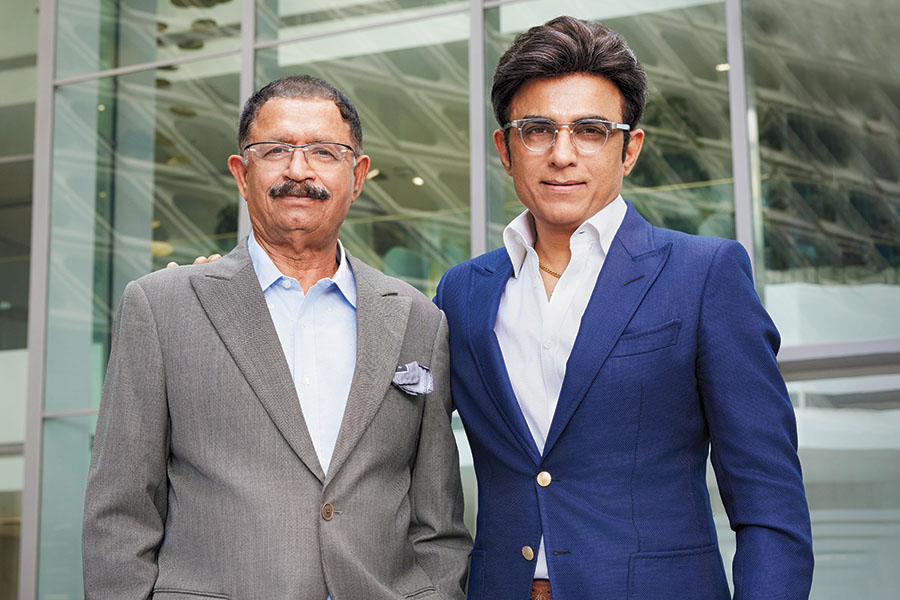 Brothers Ramesh (left) and Rajeev Juneja at Mankind Pharma’s headquarters in Delhi Image: Nishanth Radhakrishnan for Forbes Asia
Brothers Ramesh (left) and Rajeev Juneja at Mankind Pharma’s headquarters in Delhi Image: Nishanth Radhakrishnan for Forbes Asia
Rajeev Juneja recalls his first day in the pharmaceutical industry in 1984. He was 19 and had dropped out of college to work as a representative for the generic drugmaker that he had co-founded with his family. His older brother Ramesh’s instructions were clear: Leave the house by 8.30 am and don’t come back before 10 pm. Rajeev was to network with staff at a medical college near the family home in Meerut, Uttar Pradesh. “For the first two days, I didn’t have the courage to meet any doctor,” he says. His confidence slowly improved and he started shadowing other reps to see how they interacted with doctors and presented promotional materials.
Investor confidence in the company’s prospects is due in no small measure to the brothers’ goal to break into the ranks of the top three pharmaceutical companies (by domestic sales) in India. Today, the three largest are local firm Sun Pharmaceutical Industries, founded by billionaire Dilip Shanghvi, followed by AbbottIndia, a subsidiary of US-based Abbott Laboratories, and then another domestic firm, Cipla, controlled by billionaire Yusuf Hamied. (Torrent Pharmaceuticals, the No 8 player, owned by billionaire siblings Sudhir and Samir Mehta, is reportedly in talks with private equity firms to make a bid for Cipla; neither firm responded to requests for comment.)
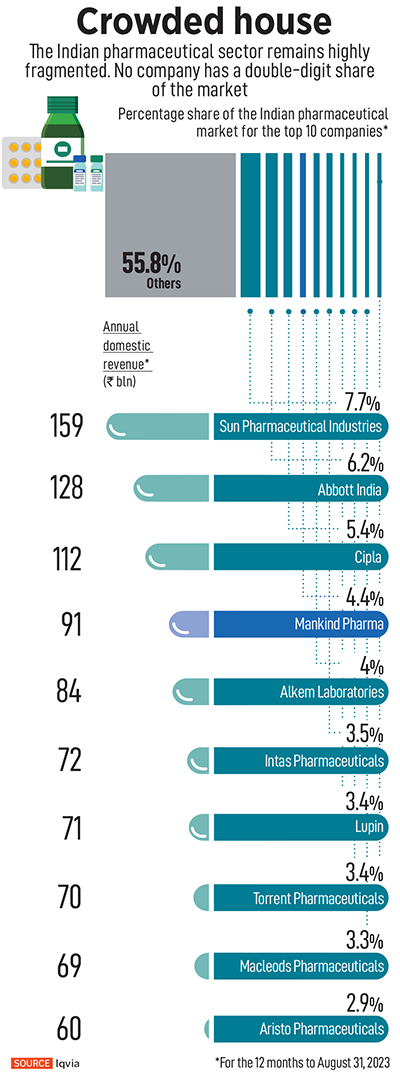 Today, Mankind ranks No 4 in revenue in the domestic market for branded generic drugs and No 3 in volume terms, according to US analytics firm Iqvia. Branded generics, or off-patent medications that are sold under a proprietary name, accounted for 96 percent of the Indian pharma market in value terms in the year to March 31, 2022, Iqvia says. With more than $1 billion in annual revenue and a 15,000-strong sales force, the Juneja brothers are mapping a plan to take on the top three.
Today, Mankind ranks No 4 in revenue in the domestic market for branded generic drugs and No 3 in volume terms, according to US analytics firm Iqvia. Branded generics, or off-patent medications that are sold under a proprietary name, accounted for 96 percent of the Indian pharma market in value terms in the year to March 31, 2022, Iqvia says. With more than $1 billion in annual revenue and a 15,000-strong sales force, the Juneja brothers are mapping a plan to take on the top three. “It will be a tall claim to say that we want to be the No 1 pharma company in India,” says Ramesh in a July interview alongside Rajeev at the company’s headquarters in an industrial area of Delhi. “But we can definitely achieve No 3 or No 2 in the next few years,” he predicts, while declining to give a revenue target.
Mankind has 25 factories that make more than 1,000 products across 36 main brands to treat pain and infections as well as cardiac ailments and diabetes. It also offers its own homegrown brands of consumer-health care products such as condoms, pregnancy tests and acne treatments. The company has six R&D centres and employs more than 600 scientists.
Mankind’s growth has come from being an outlier, says Purvi Shah, research analyst at Mumbai-based Kotak Securities. While its peers are largely focussed on selling to the US and to specialists in India’s big urban centres, Mankind gets 97 percent of its revenue from the domestic market, where it targets general physicians in smaller cities and rural areas, although it’s making rapid inroads into metros (the remaining 3 percent comes mostly from the US, Bangladesh and Sri Lanka). Another major differentiator is price. Mankind’s top 50 brands cost 20 percent less than those of its three closest competitors, according to a June report by Kunal Dhamesha, a Mumbai-based health care research analyst at Macquarie Research. According to Mankind, over 80 percent of doctors in India prescribe its drugs.
Also read: Shamsheer Vayalil: Building the largest hospital network in the Gulf
“We have saved medicine costs for thousands of customers over the years,” claims Ramesh. He says the company keeps prices low by maintaining reasonable margins and controlling costs. Mankind also benefits from economies of scale because of its high volume, says Shrikant Akolkar, vice president at Mumbai-based institutional brokerage Asian Markets Securities.
Mankind has shifted strategy over the past few years in order to tackle the top three. This has involved targeting specialists in India’s biggest cities; selling more chronic medications, which are prescribed for long periods, compared with acute medications, which are meant for short-term use; and beefing up its consumer-health care division. “Disease patterns are changing and there are more lifestyle diseases now, like diabetes and cardiac, cardiovascular and respiratory diseases,” says Rajeev. “So we have also changed our approach.”
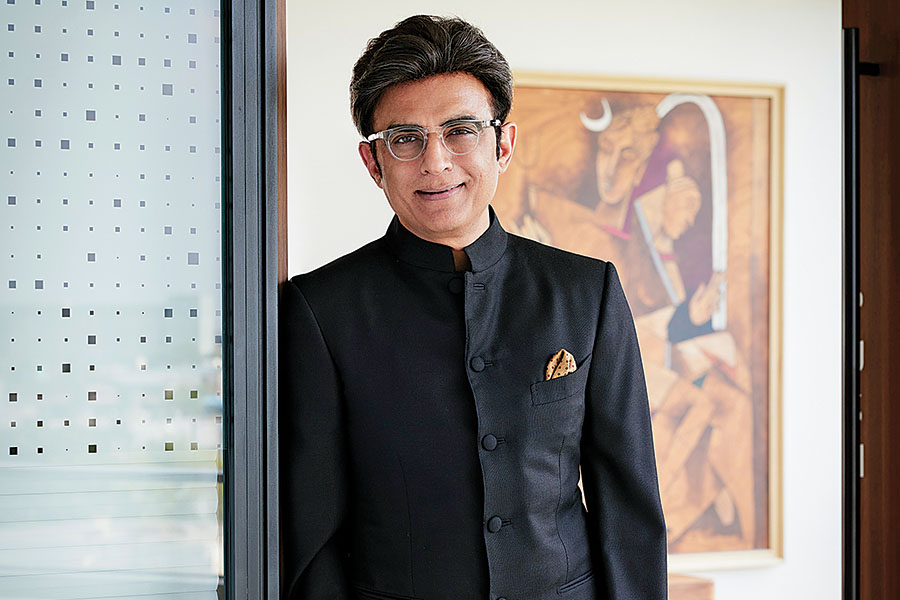 Rajeev Juneja, vice chairman and managing director, Mankind Pharma
Image: Nishanth Radhakrishnan for Forbes Asia
Rajeev Juneja, vice chairman and managing director, Mankind Pharma
Image: Nishanth Radhakrishnan for Forbes AsiaIndia’s pharma market was valued at ₹1.9 trillion ($22 billion) in the year to March 31, 2022, and is expected to grow at a CAGR of 10 to 11 percent between then and fiscal 2027, according to Iqvia. More than a third of the total comes from chronic medications. Within that segment, the market for cardio drugs is expected to grow at a CAGR of 12 to 13 percent, and medications for neurological conditions at 11 to 12 percent, over the same period. Mankind had a 4.4 percent share of the highly fragmented domestic pharma market as of end-August.
Analyst Shah says moving into the top three “is not an impossible goal”. But Mankind faces challenges. If it wants to become bigger, faster, it needs to make a big push on acquisitions, she says, and watch out for any regulatory disruptions. In August, the government proposed that doctors prescribe only unbranded generics. These so-called trade generics are cheaper than their branded counterparts and could undermine profits at companies such as Mankind. However, the proposal has since been suspended. Only 2 percent of Mankind’s fiscal 2023 revenue came from trade generics, according to Shah. Another potential snag is price controls: The government caps the cost of certain medications it deems essential. As of December 31, 2022, some 17 percent of Mankind’s drugs were on the list, which is periodically revised.

Not that any of that is affecting the company’s performance. Mankind’s net profit surged 66 percent in the first quarter ended June 30 to ₹4.9 billion, supported by an 18 percent gain in revenue to ₹25.8 billion. The results are a turnaround after net profit fell 10 percent in the year ended March 31 to ₹13.1 billion, despite a 12 percent gain in revenue to ₹87.5 billion, undermined by higher raw material costs as well as expenses related to the acquisition of the domestic formulation brands of Panacea Biotec, a unit of Delhi-based Panacea Biotec Pharma, for ₹18.1 billion.
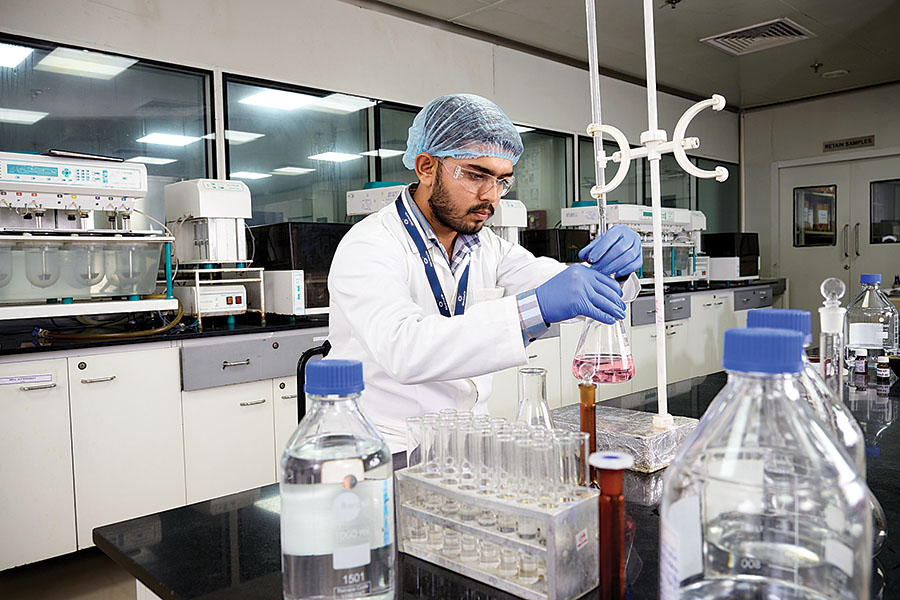 A Mankind Pharma research centre in Gurugram
A Mankind Pharma research centre in GurugramImage: Nishanth Radhakrishnan for Forbes Asia
Shah says Mankind remains vulnerable to high input prices because it is “not fully backward integrated”, meaning it must rely on suppliers for some raw materials. Analyst Dhamesha predicts that Mankind’s net profit will double to ₹26 billion by fiscal 2026, as the share of revenue from chronic medications, which are more expensive than other drugs, increases to more than 40 percent from 34 percent, boosting operating margins.
Mankind spent ₹8.3 billion in fiscal 2023 to expand manufacturing capacity and upgrade infrastructure. Ramesh says it plans to add three more factories this year. The company has increased its salesforce by about 3,000 over the past three years, which gives it one of the largest networks in the country, according to Macquarie Research. It has also created specialised sales teams to target the country’s top 3,000 hospitals and their critical-care departments.
However, the chronic space is getting crowded, warns Akolkar. “Everyone is adding medical reps and everyone is getting into therapy areas like cardiac and cardiovascular,” he says. “Continuing this kind of growth may be difficult.” In response, Rajeev notes that Mankind’s revenue from chronic medications grew 14 percent between fiscal 2021 and 2023, faster than the chronic segment as a whole, which grew at a CAGR of 12 percent in the same period, according to Iqvia. He claims 87 percent of the cardiologists Mankind approaches prescribe its products.
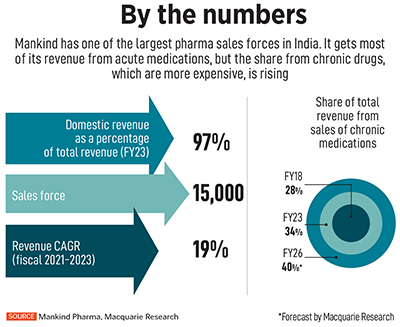 Ramesh says the other big growth driver will be the consumer health care business, which boasts four over-the-counter products that the company says are No 1 (by sales) in the markets for condoms, pregnancy tests, acne treatments and emergency contraception. “Consumer brands make up only 8 percent of our business, but they give us so much brand recognition,” says Rajeev. “But this is a tough space,” he adds. “Ninety percent of brands fail.” He declined to give a forecast for the division, but Macquarie Research says its revenues are growing at a 10 to 11 percent CAGR.
Ramesh says the other big growth driver will be the consumer health care business, which boasts four over-the-counter products that the company says are No 1 (by sales) in the markets for condoms, pregnancy tests, acne treatments and emergency contraception. “Consumer brands make up only 8 percent of our business, but they give us so much brand recognition,” says Rajeev. “But this is a tough space,” he adds. “Ninety percent of brands fail.” He declined to give a forecast for the division, but Macquarie Research says its revenues are growing at a 10 to 11 percent CAGR.Over the past two years, Mankind has made acquisitions to support both the chronic-medications and consumer health care businesses. As well as the Panacea Biotec deal, it agreed to licence a heart-failure medication from Switzerland-based Novartis. It also acquired a skincare line and an inhaler brand from Hyderabad-based Dr Reddy’s Laboratories, and a majority stake in Delhi-based health and wellness brand Upakarma Ayurveda. Other than the Panacea Biotec purchase, the cost of the acquisitions was not disclosed.
Another boost to the company’s prospects was its public offering, giving it access to equity financing. However, two days after the listing, Mankind notified the stock exchanges that the income tax department was “conducting a search at some of the premises/plants related to the company and some of its subsidiaries”. Mankind said in the filings that it was responding to queries raised by tax officials, and that there was no impact on its operational performance. The search concluded in May and the company says results have not been released. The tax agency did not respond to requests for comment.
Also read: Storyboard18 | Behind Mankind's Plans To Take Prega News To Rural Markets
Analysts say Mankind’s stock benefits from being the only listed large-cap pharma that is a pure domestic play. “There’s a premium for domestic players like Mankind because the Indian market has good visibility and high predictability of revenue,” says Akolkar. “It’s not subject to the pricing pressures and regulatory challenges associated with the US,” he says.
Asked about exports, Rajeev is adamant. “Our focus will always be domestic,” he says. “If we create a complex, difficult-to-manufacture and differentiated product, then there is a benefit in exporting.” He adds: “Otherwise it’s just a commodity and we don’t want to compromise on profitability.” There is plenty of room for growth at home, where per capita spending on pharmaceuticals is $16, compared with $100 in other emerging markets and $650 in developed countries, according to data from Iqvia and Macquarie Research.
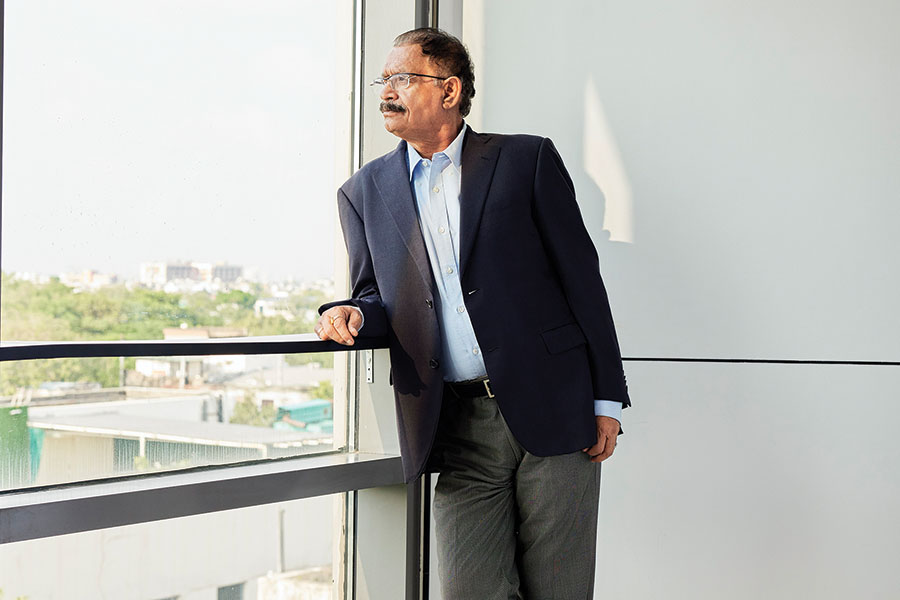 Ramesh Juneja, chairman, Mankind Pharma
Image: Nishanth Radhakrishnan for Forbes Asia
Ramesh Juneja, chairman, Mankind Pharma
Image: Nishanth Radhakrishnan for Forbes AsiaThe pharma journey for the Juneja family began in 1974, when Ramesh, second of five siblings and the oldest of three brothers, started as a sales rep with a small drug company in Delhi after graduating with a science degree from Deva Nagri College in Meerut. A year later, he became a regional sales rep for Mumbai-based Lupin, controlled by the Gupta family, now the No 7 firm in the market.
Also read: K.P. Ramasamy: Playing the long game in garment exports
He resigned from Lupin in 1983 and with Rajeev, another brother, Greesh, their sister Prabha Arora, and an external partner, set up pharma company BestoChem, at which Rajeev started his career. In 1995, Ramesh, Rajeev and Prabha’s husband, Prem Kumar Arora, left BestoChem and invested a combined ₹5 million to launch Mankind, a company they had incorporated four years earlier. Greesh remains a director at Delhi-based BestoChem, which is unlisted.
Mankind began with 25 reps selling painkillers and antibiotics, then a decade later moved into diabetes and hypertension pills. In 2007, it launched a line of condoms called Manforce, its first homegrown consumer health care brand. The same year, private equity firm ChrysCapital, based in Mauritius, took an 11 percent stake for ₹850 million, valuing Mankind at ₹7.7 billion. It sold the shares in 2015 to US-based private equity firm Capital International Group for a 14-fold return. Three years later, ChrysCapital bought a 10 percent stake at double the 2015 valuation. It sold a 2.5 percent holding in the May IPO but retained 7.5 percent. Capital International also sold shares in the IPO but still has 6 percent.

“When we first invested in 2007 it was more of a call on the entrepreneurial ability of Ramesh Juneja,” says Sanjiv Kaul, partner at ChrysCapital. The second time the focus was on the next generation, led by Rajeev, he adds. “While Ramesh Juneja continues to play a father role, Rajeev is the right man, at the right place, at the right time,” he says.
Ramesh comes into the office for five to six hours a day but leaves day-to-day management to Rajeev and the younger generation, which includes Prem’s son Sheetal, 47, CEO; Ramesh’s son Arjun, 37, chief operating officer; and Rajeev’s son Chanakya, 27, director of technology.
Ramesh tries to keep the family’s success in perspective. “Your feet should always be on the ground,” he says. “We started from the bottom of the pyramid, everything we did was for survival.”

















